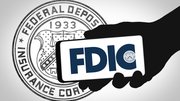News
Another bank megamerger: Morgan Chase buying Bank One
January 14, 2004
CHICAGO - Bank One Corp. will be purchased by New York-based J.P. Morgan Chase & Co.for about $55.1 billion in stock.
The deal, announced Jan. 14, is the third-largest bank acquisition ever, behind the 1998 Citicorp-Travelers and the 1998 Bank of America-Nationsbank transactions, according to a Chicago Sun-Times report.
The combination of J.P. Morgan, the second-largest U.S. bank, with $792 billion of assets, and Bank One, the sixth-largest bank, with $290 billion of assets, will create the second-largest bank in the United States, with $1.08 trillion of assets. Citigroup Inc. has $1.2 trillion of assets.
The merged company will keep the J.P. Morgan Chase & Co. name and be based in New York. But the banks said they will keep consumer banking operations and some commercial lending businesses in Chicago, and they said they intend to continue Bank One's aggressive expansion of new branches and ATMs.
(See related stories Bank One makes major ATM investment in Chicago and Bank One to spend $5M on ATMs, branches in Dayton)
The Bank One name will remain on signs and branches for now, though the banks say they will research what will be the best long-term brand.
The banks and analysts say the combination is a good one, because it blends J.P. Morgan's emphasis on commercial and investment banking with Bank One's consumer banking franchise. Bank One operates the former First USA credit-card operations and a massive retail network of about 1,800 branches concentrated in the Midwest. J.P. Morgan has a smaller credit-card business and just 530 branches in the New York area and Texas.
"This is such a compelling fit here, across all the products, all the business lines, we almost had to do it," said Bank One chief executive Jamie Dimon in a phone interview with the Sun-Times.
Dimon, 47, will become president and chief operating officer at J.P. Morgan, and succeed Harrison as chief executive officer in 2006. Harrison will remain chairman.
Dimon is a former Citigroup executive who was on track to succeed Citi chief executive Sandy Weill before being ousted over a clash in management styles. He joined Bank One in 2000 -- the year the company lost more than half a billion dollars, its biggest loss ever. Under Dimon, the bank's financial performance improved -- though not as much as analysts would have liked.
"A large deal of one form or another would be of most benefit to Bank One shareholders. It was difficult to get excited about the stock in the absence of a large deal," said Brad Vander Ploeg, an analyst with Raymond James & Associates.
Much of Bank One's recent profit growth came because the bank was writing off less bad debt than before.
"That can support you for a while, but when you get to the end of that, when credit quality doesn't improve any more, you really need loan growth, new sales to existing customers to come through ... and they weren't getting that," Vander Ploeg said.
According to a Wall Street Journal report, Dimon's initial approach at J.P. Morgan will likely combine two strategies: cost-cutting and a reduction of the combined entity's exposure to risk, items he focused on at Bank One. The merging companies said they anticipate $2.2 billion in cost savings in the first three years.
William Harrison, J.P. Morgan's chairman and chief executive, said the companies' integration plan calls for the elimination of as many as 10,000 jobs, or about 7 percent of their combined U.S. work force of 145,000. Specific job cuts have not yet been identified.
'But ... the number hopefully will not be near 10,000,' Harrison said.
The new J.P. Morgan could soon be hunting for more deals. Both Harrison and Dimon have built their careers, in part, through executing mergers. The latest deal would provide a strong platform to diversify into other financial businesses or to expand the geographical range of their consumer banking franchise, according to the Wall Street Journal.
Bank One shareholders will be paid 1.32 shares of J.P. Morgan Chase stock for each share of Bank One stock they own, which, based on J.P. Morgan's closing price of $39.22 Wednesday, will give Bank One shares a value of $51.77 apiece, roughly 15 times Bank One's estimated earnings for 2004.
The companies expect the merger to close sometime this summer.
According to the Wall Street Journal, the merger may further fuel a wave of consolidation that already is well under way in U.S. banking. Late last year, Bank of America agreed to buy FleetBoston Financial Corp. for more than $40 billion.
 ChatGPT
ChatGPT Grok
Grok Perplexity
Perplexity Claude
Claude












